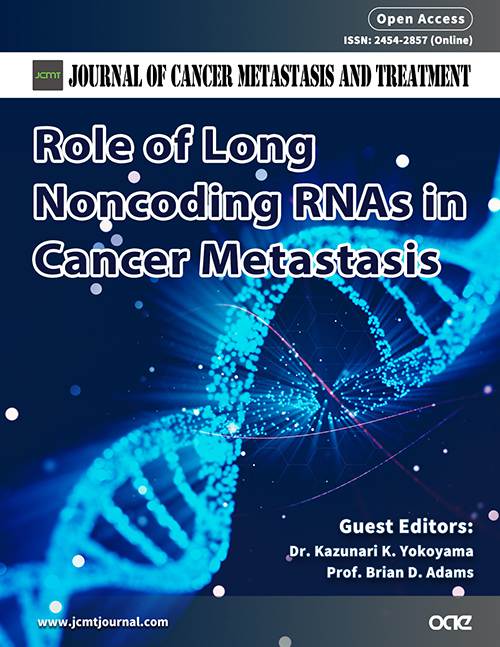
Topic: Role of Long Noncoding RNAs in Cancer Metastasis
A Special Issue of Journal of Cancer Metastasis and Treatment
ISSN 2454-2857 (Online) 2394-4722 (Print)
Submission deadline: 10 Jul 2024
Guest Editor(s)
Department of RNA Science at The Brain Institute of America, New Haven, CT, USA.
Special Issue Introduction
Specifically, lcRNAs are a divergent class of ncRNA molecules greater than 200 nt in length that lack protein-coding capacity, and are initially considered a genetic byproduct because of the absence of biological function. However, when lncRNAs have aberrantly expressed, the checkpoints that maintain cellular growth and differentiation processes fail, supporting a process known as epithelial to mesenchymal transition (EMT).
EMT is the transformative process by which cells loose epithelial polarity and become motile, thereby enabling epithelial cells to transit to a mesenchymal phenotype, intravasate into vascular systems, and extravasate to distant organ sites. Given EMT is the rate-limiting step at which a tumor cell becomes metastatic, resulting in a fatality, many investigators have dedicated their efforts to understanding the cell signaling cues that initiate and support EMT.
Recently, a number of studies have identified lncRNAs that control the cellular processes related to EMT, and moreover, modulate the phenotypic observation of metastatic dissemination in vivo. Therefore, this Special Issue focuses on studies that showcase how certain lncRNAs can modulate or disrupt the initiating processes of metastasis (i.e., modulate epithelial cell polarity, anchorage-independent growth, wound healing, migration, and invasion). By elucidating how these lncRNAs control the biological processes supporting metastatic progression, therapies that target this process can be developed in order to reduce tumor-related deaths associated with aggressive carcinomas.
Keywords
lncRNA, long non-coding RNA, non-coding RNA, cancer, epithelial-mesenchymal transition, mesenchymal-epithelial transition, chromatin regulation, epigenetic control, malignancy, precancerous state
Submission Deadline
Submission Information
For Author Instructions, please refer to https://www.oaepublish.com/jcmt/author_instructions
For Online Submission, please login at https://oaemesas.com/login?JournalId=jcmt&SpecialIssueId=jcmt20211028
Submission Deadline: 10 Jul 2024
Contacts: Grace Wong, Assistant Editor, grace-editor@jcmtjournal.com




